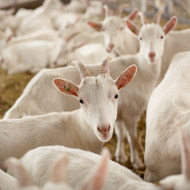
Vaccine can be used without refrigeration for up to a month
Researchers have developed a new vaccine for peste des petits ruminants (PPR) which can be used without refrigeration for up to a month.
It is hoped the new vaccine will help to eradicate this devastating disease - also known as goat plague - in developing countries.
PPR is a highly contagious disease that affects small ruminants. Once introduced, it can infect up to 90 per cent of the herd and kill up to 70 per cent of infected animals.
While the current PPR vaccines provide lifelong immunity, they can lose their potency and become ineffective when being stored or transported. This problem increases the cost of vaccines and limits their availability.
In the study, researchers looked to another vaccine which successfully wiped out Rinderpest - an infectious viral disease of cattle. The vaccine was freeze-dried and could be used in the field for up to 30 days without refrigeration.
The researchers applied the same method of freeze-drying rinderpest to the Nigeria 75/1 PPR vaccine strain and measured thermostability in accelerated stability tests at 37 degrees Celsius.
They found that vaccines produced using the rinderpest method of freeze drying were the most stable, possessing sufficient thermostability for use without a cold chain for up to 30 days.
“The rinderpest method of thermostabilization has been successfully commercialised in the past indicating that the commercialisation of thermostable PPR vaccine using the rinderpest method is feasible and can greatly facilitate the eradication of PPR,” the researchers explain.
The team now hope to adapt production of the vaccine for use on a commercial scale and pilot its use in practical field programmes.
The research was carried out by the International Livestock Research Institute and published in the journal Vaccine.



 The Federation of Independent Veterinary Practices (FIVP) has announced a third season of its podcast, Practice Matters.
The Federation of Independent Veterinary Practices (FIVP) has announced a third season of its podcast, Practice Matters.